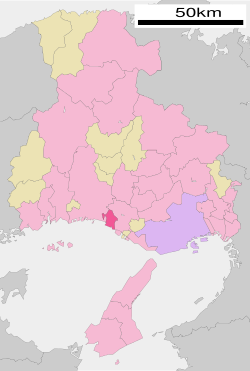Takasago, Hyogo
|
Takasago 高砂市 |
||
|---|---|---|
| City | ||

Futon Yatai in Sone Tenmangu Festival on October
|
||
|
||
 Location of Takasago in Hyōgo Prefecture |
||
| Location in Japan | ||
| Coordinates: 34°46′N 134°47′E / 34.767°N 134.783°ECoordinates: 34°46′N 134°47′E / 34.767°N 134.783°E | ||
| Country | Japan | |
| Region | Kansai | |
| Prefecture | Hyōgo Prefecture | |
| Government | ||
| • Mayor | Yukihito Nobori | |
| Area | ||
| • Total | 34.40 km2 (13.28 sq mi) | |
| Population (March 31, 2012) | ||
| • Total | 95,259 | |
| • Density | 2,769.16/km2 (7,172.1/sq mi) | |
| Symbols | ||
| • Tree | Pine | |
| • Flower | Chrysanthemum | |
| Time zone | Japan Standard Time (UTC+9) | |
| City hall address | 1-1-1, Araichō Chidori, Takasago-shi, Hyōgo-ken 676-8501 |
|
| Website | www |
|
Takasago (高砂市 Takasago-shi?) is a city located in Hyōgo Prefecture, Japan. The city was founded on July 1, 1954. It lies between the cities of Kakogawa to the east and Himeji to the west, which is known for its castle.
As of March 31, 2012, the city has an estimated population of 95,259, with 38,479 households and a population density of 2,769.16 persons per km². The total area is 34.40 km².
Takasago was a fishing town and a place known for its ports, but it has since been industrialized and many factories for major companies dot its skyline in the south, such as the Kobe Steel Takasago Manufacturing Complex, Mitsubishi Paper Mills, Takuma Power Plant, and Kikkoman Soy Sauce.
Major routes of transportation include the JR train line in the north and Sanyo Densha (山陽電車?) line to the south. The Meiki Kansen (明姫幹線?) is the major highway connecting the cities of Akashi and Himeji, running through Takasago and Kakogawa in the process. The shinkansen also runs through the heart of Takasago, but does not make any stops there.
...
Wikipedia


